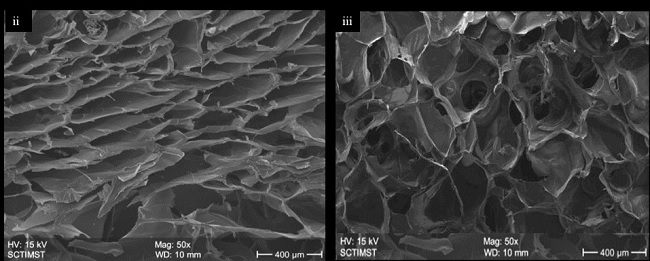

1. Stem Cell Research
Our research in Stem cell based tissue engineering at SDSOS has demonstrated differentiation of human mesenchymal stem cells into function hepatocytes (liver cells) using three-dimensional (3D) polymer scaffolds. Our research work, in press (Chitrangi et al., 2016) in Journal of Tissue Engineering and Regenerative Medicine (Impact factor 5.19) (http://onlinelibrary.wiley.com/journal/10.1002/(ISSN)1932-7005) has shown that 3D scaffolds supported hepatospheroid formation, recapitulating a microenvironment, thus mimicking an in vivo environment. Studies are underway to utilize this system an in vitro model for drug metabolism and toxicity testing. The collaborative research with the prestigious Department of Science & Technology Institute, Sree Chitra Tirunal Institute for Medical Sciences and Technology (SCTIMST), Thiruvananthapuram, has opened up newer exciting avenues in the treatment of liver diseases and in drug discovery process.
Another aspect of our research was to understand the role of the role of microRNAs during the differentiation process and also to establish novel protocols for efficient differentiation of human umbilical cord derived mesenchymal stem cells into hepatocyte-like cells (HLCs). Our research published in Experimental Cell Research (Impact factor-3.2) showed enhanced expression of hepatocyte-specific – miRNAs in valproic acid (histone deacteylase inhibitor) mediated hepatic trans-differentiation into HLCs. http://www.sciencedirect.com/science/article/pii/S0014482716300568) The study also established a novel protocol to acquire hepatocyte like cells (HLCs). Future perspective of this study would be to use a group of these hepatocyte-specific miRNAs for conversion of MSCs into hepatocyte like cells without using growth factors so as to get pure population of hepatocytes, which could be used for cell based therapies.
2. Cancer Research:
Our focus on a critical aspect in biomedical research constitutes clinical applications of molecular basis of oral cancer, a high incidence cancer in India with 26% of global oral cancer burden contributed by India. At SDSOS, we are investigating whole genome and transcriptome profile of oral cancer patients using contemporary high throughput systems such as Illumina WGAS and Real Time PCR. The expression profile indicated a panel of biomarkers, published in the international journal - Medical Oncology, 2015, Impact Factor – 2.6.
http://link.springer.com/article/10.1007/s12032-015-0483-4
The investigations on genomic variants in oral cancer defined single nucleotide polymorphisms identifying ‘Predictive Biomarkers’ with increased risk or susceptibility to oral cancer in tobacco habitues, and the results are published in Tumor Biology, 2015, Impact factor – 3.6.
http://link.springer.com/article/10.1007/s13277-015-4448-1
A review on Clinical implications of epigenetic regulation highlighting applications of understanding the molecular basis of oral cancer was published in the journal Oral Oncology, 2015, Impact factor – 3.6. http://www.sciencedirect.com/science/article/pii/S1368837515003267 Our clinical collaborations with highly esteemed oncologists Dr.Sultan Pradhan, Prince Aly Khan Hospital, Mazgaon, Dr.Ashok Mehta, BSES Hospital, Andheri, and Dr.Nagaraj Huilligol. Nanavati Hospital, Vile Parle ensures translational applications of the research projects at SDSOS. The research projects were funded by NMIMS (deemed-to-be) University.
3. NanoScience Research:
Research in Nanoscience at SDSOS encompass design of functionalized nanomaterials for applications in biomedical areas and energy devices. Recently, our research in understanding mechanism of interaction of nanoparticles with the coating material has been published in Colloids and Surfaces B: Biointerfaces (Impact factor: 4.152). This work reports the physicochemical parameters and the nature of association between magnetic nanoparticles and bovine serum albumin (BSA) in presence of cationic and anionic surfactants.
(http://www.sciencedirect.com/science/article/pii/S0927776515301417). With this study, mechanistic insights of the interactions taking place at the interface of the nanoparticles were achieved which is important for designing a stable colloidal nanosystems.
Our research at SDSOS focused on synthesis of novel nanoparticulate form of biocompatible Arsenic trioxide (As2O3), a well-known anticancer drug for acute promyelocytic by coating it with dimercaptosuccinic acid (DMSA) and chitosan and study its anticancer and antiproliferative mechanism on human prostate cancer cell lines (LNCaP and PC-3 cell lines).
In vitro anticancer efficacy of these nanoparticles (NPs) was assessed in terms of DNA damage, changes in epigenetic modulations, expression level of apoptotic markers and cell cycle analysis following treatment with As2O3 NPs. The findings of this work was published in Life Sciences (Jadhav et al, 2016) (Impact factor- 2.7) (http://www.sciencedirect.com/science/article/pii/S0024320516300911?np=y) Our results demonstrated that the nanoparticulate formulation is capable of inducing morphological changes, DNA damage, cell cycle arrest and caspase-dependent apoptosis along with the expression of cyclin-dependent kinase inhibitor p21 by upregulation of Bax and downregulation of Bcl-2 and Bcl-xL proteins and by inducing changes in epigenetic modifications at histone tails. The results show that the biocompatible As2O3 nanoparticles has reduced toxicity to normal cells, but the antiproliferative effect on prostate cancer cell lines follow similar death pathway as that of bare As2O3 nanoparticles.